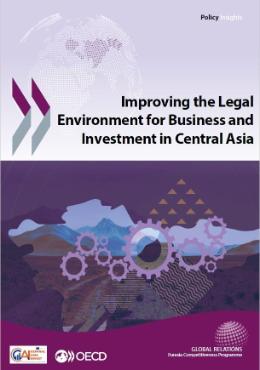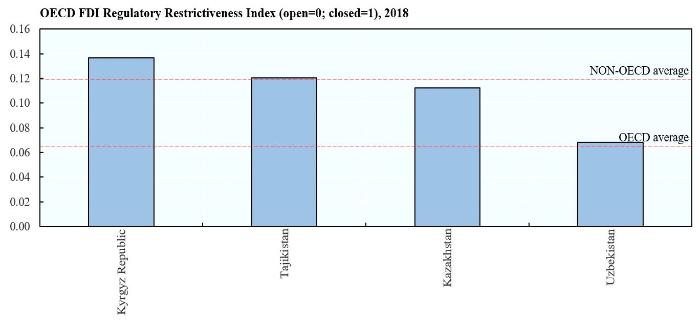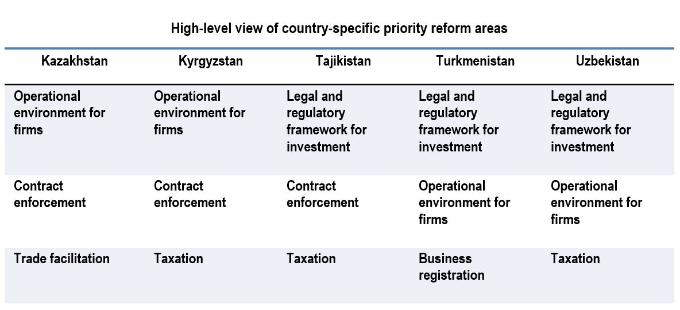Improving the Legal Environment for Business in Central Asia
Improving the Legal Environment for Business in Central Asia
 |
Weaknesses in the framework conditions for private sector development and foreign direct investment have contributed to the over-reliance of Central Asian economies on a narrow range of often volatile growth drivers, principally exports of primary commodities and labour. Despite recent reforms across the region –streamlining legislation or introducing new digitalisation programmes – the business environment in Central Asia remains challenging. Even where policy formal settings have improved considerably, uneven implementation and enforcement, as well as frequent policy changes, create a significant gap between de jure protections and the de facto operational environment for firms. The COVID-19 pandemic has exacerbated this problem and reinforced the need to address long-standing barriers to business development that could help the region transition to a more dynamic, private sector-driven growth model. The Improving the Legal Environment for Business and Investment Central Asia project, part of part of the ongoing EU-financed Central Asia Initiative, looks to address one set of such barriers: the legal and regulatory frameworks for business and investment in Kazakhstan, Kyrgyzstan, Tajikistan, Turkmenistan and Uzbekistan. The project report, discussed at a ministerial meeting in September 2020 and launched in April 2021, presents the findings of an assessment of ten dimensions of the legal environment that are crucial for a healthy business climate. The report discusses priority areas for reform identified for each country from among a range of policy dimensions studied in the report, with the most frequently occurring being related to investment legislation and enforcement, trade facilitation and the local operational environment for SMEs. The report offers specific policy recommendations on these priorities for each of the five countries. Read the reflections of OECD Global Relations Director Andreas Schaal on why improving legal and regulatory framework conditions are so important to recovery in Central Asia here.
|
:
Improving the Legal Environment for Business and Investment in Central Asia
From de jure to de facto: the importance of bridging the implementation gap
Drawing upon the OECD Policy Framework for Investment, SME Policy Index, Trade Facilitation Indicators and the FDI Regulatory Restrictiveness Index, the OECD team studied ten dimensions that are crucial for a healthy business climate: the legal and regulatory frameworks for investment; tax regulations; land legislation; registration procedures; contract enforcement and dispute settlement; the operational environment for business; trade facilitation; expropriation regimes; exit mechanisms; and public-private dialogue.
The analysis of these ten dimensions shows that the formal statutory conditions for business have improved, but the legal environment in which firms operate remains complicated, changeable and often opaque. Governments have often reached for the low hanging fruit of reform – such as reducing administrative burdens for start-ups – while leaving more complicated or sensitive challenges unaddressed. As a result, there are sometimes large gaps between the de jure freedom to do business and the de facto operational environment, which is characterised by such problems as the unpredictability of tax systems, poor implementation of regulations, and licensing and permitting arrangements that can be complex, expensive, arbitrary and opaque.
 |
The Central Asian countries’ scores on the OECD’s FDI Regulatory Restrictiveness Index suggest that the region performs relatively well compared to the non-OECD average in terms of statutory openness. Yet actual FDI inflows have been modest, particularly to non-resource sectors. If the countries of Central Asia are to larger inflows – and to reap the benefits of FDI spillovers for the domestic private sector – then governments must address a number of weaknesses in their business climates, and ensure that regulations and policies are effectively and consistently enforced.
Upcoming Events
The OECD Eurasia Division will organise capacity building workshops on each of the priorities identified in the Improving the Legal Environment for Business and Investment in Central Asia report throughout 2021.
 |
Key Contacts
|
Mr William Tompson Head of Division OECD Eurasia |
Mr Grégory Lecomte Senior Policy Analyst / Head of Unit OECD Eurasia |
|
Mr Luke Mackle Policy Analyst OECD Eurasia |
Ms Mariana Tanova Project Adminstrator OECD Eurasia |
 |
 |
Related Documents

